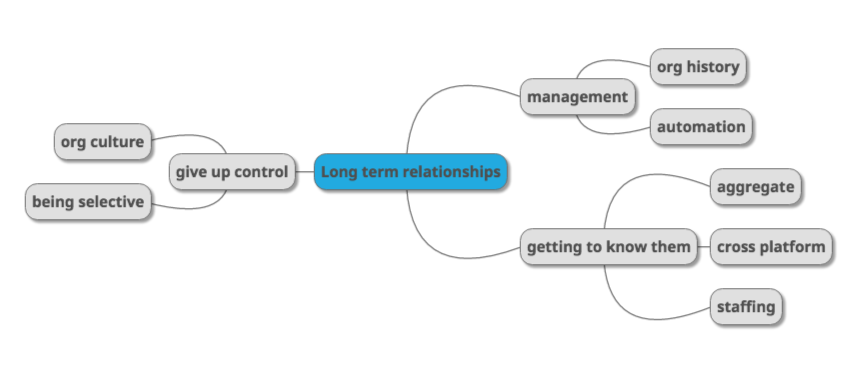Influencer marketing, as most practices do, is advancing along a maturity curve.  Here is the first of three ways I see evidence it is moving, based on engagement with customers, watching other vendors in the space, and more. Then some thoughts on the consequences of these developments.
Building long term relationships
Influencer engagement has compounding returns and the model of just-in-time cold call pay-to-play is far from the only game in town.

Clockwise from the top right: If we as influencer marketing practitioners start building more long term relationships, we’re going to need technology to manage that.  Specifically, in order for this to be a sustainable practice, we should be able to track our organization’s history of engagement with a given thought leader and we should be able to leverage automation as much as possible where appropriate.  I like to say: let’s use automation to surface opportunities to engage – let’s not use automation for the actual engagement itself. Â
Next, we’re going to need to get to know the people we’re engaging with: as a group, as individuals but across platforms, and based on relationships built by the right people in the right places in our organizations. Â For your company to get to know influential people well is a staffing issue.
Finally, developing long term relationships and working with people over time requires that we give up some control. Â I’ve honestly had someone say “these thought leaders you found are great…how do I get them to do what I want?” Â Lol, yeah so…that’s not really how it works. Â We’re going to engage with and collaborate with these people respectfully, as peers. Â That means two other things: we need an organizational structure that supports that kind of work and we need to be selective about the people we engage with. Â Since they won’t be reporting to us – let’s vet them before we spend a bunch of time engaging them. Â Or we could use software to discover and vet thought leaders for credibility in specific contexts, then use its automation to track opportunities and history of engaging with them…that’s what I suggest.
This post took longer to write than I thought it would. I’m sitting in the lobby of the Brooklyn Museum and just got surrounded by kids, curious to look at my computer. 😉 Â In subsequent posts I’ll write about the future trends of B2B influencer marketing and the use of influencer marketing for gathering market intelligence research.
